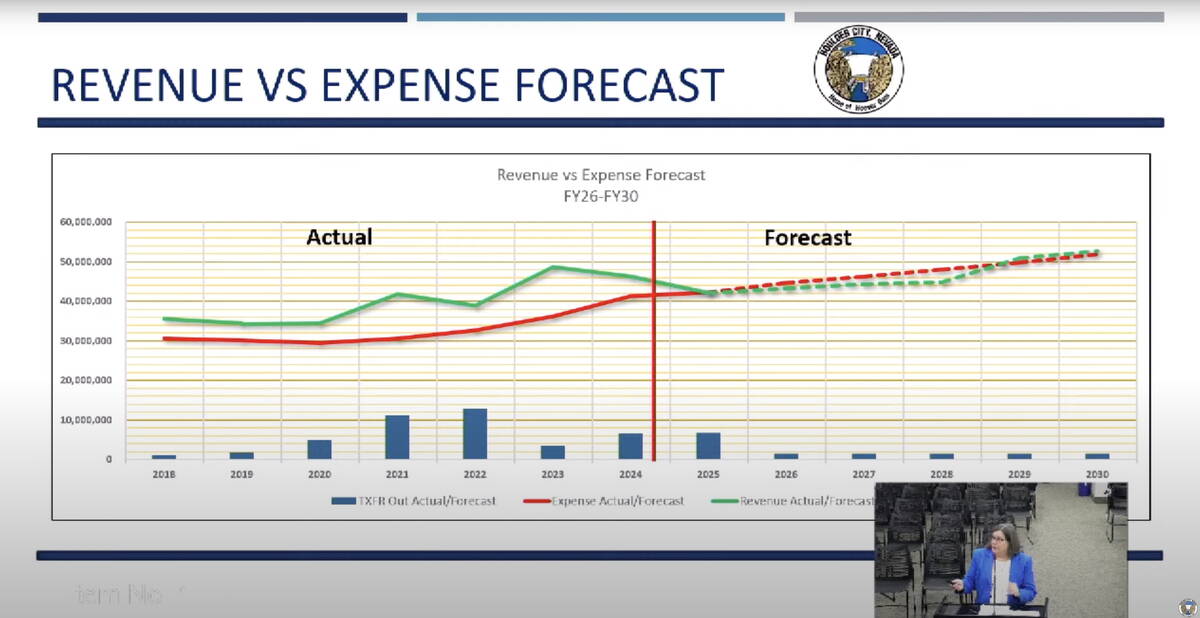BC welcomes city manager
Boulder City’s new City Manager Ned Thomas chose an auspicious day to start his new job. No, that is not a reference to April 15 as Tax Day, but it is about finances.
In his first “act” as the guy in the Big Chair, he attended a previously-scheduled special city council meeting where the tentative budget for fiscal year 2026 was presented.
Opening the meeting, Mayor Joe Hardy quipped, “It’s probably reasonable to introduce the new city manager who is sitting here with us and the former acting city manager is relaxing.”
Community Development Director Michael Mays has served as acting city manager since Taylour Tedder’s departure on May 8 of last year. He served in the same position for about a year after a previous city council fired then-manager Al Noyola in 2020, meaning that Mays has acted as city manager for almost two of the past four and a half years.
Mays essentially did both jobs (again) for almost a year. In a release announcing that Thomas was starting the job Tuesday, Hardy said, “I truly appreciate the hard work Michael has done over the past 11 months, working extra hours and weekends to keep pace with the additional workload. I thank him for his dedication and commitment to the residents of Boulder City.”
Thomas was selected from more than 100 candidates after a six-month national search with WBCP, Inc., an executive municipal recruiting firm. He has three decades of experience in municipal government and leadership roles. Until last week, Thomas served as city manager in Milpitas, Calif., a city north of San Jose with 81,000 residents. He traveled back and forth for the past few years while his family resided at their home in Henderson.
“I have been waiting and watching for the right opportunity to become available in Southern Nevada, and I was thrilled to hear about the city manager position in Boulder City,” he said in the same press release.
The city charter requires the city manager live in Boulder City but last year, the council amended their initial contract to give Thomas one year to move and establish residency.
“I am excited about living and working in a close-knit community with such a unique and interesting history,” said Thomas. “Making personal connections is vitally important to my success as a city manager, and I want to hear a variety of perspectives from Boulder City residents, business owners, employees, and community leaders. I plan to visit every department and facility in the city to meet the staff and hear their concerns. I will also visit community organizations and businesses to hear their thoughts on city services and operations.”
Cherlynn, his wife of 27 years, works as a long-term substitute teacher in the Clark County School District and currently teaches Spanish at Foothill High School. They have four adult children: the youngest, Julianna (18) will graduate from Foothill High School in May. Bretton (20) is currently working away from home and will start college in the fall; Whitney (21) is attending college; and Harrison (23) is married and attending college.
While one member of the council, Steve Walton, addressed a question to staff and specifically asked if Thomas wanted to weigh in, he did not speak during the meeting, which was led by Finance Director Cynthia Sneed and Budget Director Angela Mananon.
Sneed started things off saying, “I am very pleased to put forward a tentative budget. It’s a balanced budget due to a lot of hard work by all the department heads.” The city is mandated to keep a balanced budget in its charter. Per Sneed, the initial budget came in heavy on the expense side and department heads all had to trim back their requests.
The city can’t take out more than $1 million in debt without it being approved first by voters, which was one of the challenges cited by Sneed.
“Often cities will use debt as a mechanism to fund capital projects,” she said.
“Some of the challenges we face every year, including this year is that our lease revenue is 35% of our general fund budget,” she continued. “The good news is it helps us get balanced, but it’s largely outside of property taxes and other resident-driven revenue.”
“Our labor costs are a huge portion of our expenses. It’s approximately 75% of our overall expenses including salary and benefits. So that is something to be mindful of. And this year, in particular, we are experiencing a great deal of increase in our retirement contributions. So that is further burdening our budget. And then, nationally, we are experiencing a lot of uncertainty in the economy and what kind of inflation we are going to see and the cost of goods. These are all challenges we had to deal with as we put this budget together.”
The headline news is probably that the graph lines representing revenue and expenses are crossing right about now. Historically, since at least the 2018 fiscal year, revenues have comfortably exceeded expenses. However, starting with the 2026 fiscal year, which starts in about 10 weeks, projected expenses are expected to outpace projected revenue. Sneed said that this situation is expected to continue until about the 2029 fiscal year when additional solar projects are expected to come online.
This is just the beginning of the process for setting the budget. On April 22, the proposed budget will be reviewed in the council’s regularly-scheduled meeting and a public hearing on the budget is scheduled for the May 27 meeting when the final budget will also be voted on and adopted.
















